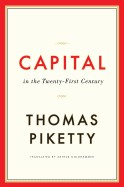Check nearby libraries
Buy this book

What are the grand dynamics that drive the accumulation and distribution of capital? Questions about the long-term evolution of inequality, the concentration of wealth, and the prospects for economic growth lie at the heart of political economy. But satisfactory answers have been hard to find for lack of adequate data and clear guiding theories. In this work the author analyzes a unique collection of data from twenty countries, ranging as far back as the eighteenth century, to uncover key economic and social patterns. His findings transform debate and set the agenda for the next generation of thought about wealth and inequality. He shows that modern economic growth and the diffusion of knowledge have allowed us to avoid inequalities on the apocalyptic scale predicted by Karl Marx. But we have not modified the deep structures of capital and inequality as much as we thought in the optimistic decades following World War II. The main driver of inequality, the tendency of returns on capital to exceed the rate of economic growth, today threatens to generate extreme inequalities that stir discontent and undermine democratic values if political action is not taken. But economic trends are not acts of God. Political action has curbed dangerous inequalities in the past, the author says, and may do so again. This original work reorients our understanding of economic history and confronts us with sobering lessons for today.
Check nearby libraries
Buy this book

Previews available in: English French
Subjects
Capitalism, wealth, capital, inequality, social welfare, democracy, Wohlstand, Income distribution, Produktionsfaktor, Einkommensverteilung, Labor economics, Arbeitsökonomie, Kapital, nyt:hardcover-nonfiction=2014-04-13, New York Times bestseller, economy, thomas piketty, History, Equality, Distribution (Economic theory), Revenu, Répartition, Richesse, Économie du travail, BUSINESS & ECONOMICS, Finance, POLITICAL SCIENCE, Public Policy, Economic Policy, Kapitalism, Inkomstfördelning, Jämlikhet, Finance and Accounting, Hb501 .p43613 2014, 332/.041, Qc 200, Capitalisme, Histoire, Répartition (Théorie économique), Disparités de salairesPeople
Karl Marx (1818-1883), David RicardoTimes
1700-2013Showing 3 featured editions. View all 19 editions?
| Edition | Availability |
|---|---|
|
1
Capital in the Twenty-First Century
2017, Harvard University Press
in English
0674979850 9780674979857
|
eeee
|
|
2
Capital in the twenty-first century
2014, The Belknap Press of Harvard University Press
in English
067443000X 9780674430006
|
aaaa
|
| 3 |
cccc
|
Book Details
Edition Notes
Classifications
Edition Identifiers
Work Identifiers
Source records
Internet Archive item recordamazon.com record
marc_openlibraries_sanfranciscopubliclibrary MARC record
Better World Books record
Library of Congress MARC record
marc_scms MARC record
marc_columbia MARC record
marc_columbia MARC record
marc_nuls MARC record
harvard_bibliographic_metadata record
Work Description
What are the grand dynamics that drive the accumulation and distribution of capital? Questions about the long-term evolution of inequality, the concentration of wealth, and the prospects for economic growth lie at the heart of political economy. But satisfactory answers have been hard to find for lack of adequate data and clear guiding theories. In Capital in the Twenty-First Century, Thomas Piketty analyzes a unique collection of data from twenty countries, ranging as far back as the eighteenth century, to uncover key economic and social patterns. His findings will transform debate and set the agenda for the next generation of thought about wealth and inequality.
Piketty shows that modern economic growth and the diffusion of knowledge have allowed us to avoid inequalities on the apocalyptic scale predicted by Karl Marx. But we have not modified the deep structures of capital and inequality as much as we thought in the optimistic decades following World War II. The main driver of inequality--the tendency of returns on capital to exceed the rate of economic growth--today threatens to generate extreme inequalities that stir discontent and undermine democratic values. But economic trends are not acts of God. Political action has curbed dangerous inequalities in the past, Piketty says, and may do so again.
A work of extraordinary ambition, originality, and rigor, Capital in the Twenty-First Century reorients our understanding of economic history and confronts us with sobering lessons for today.
(Original text from the spine of the book)
Community Reviews (0)
History
- Created April 1, 2014
- 15 revisions
Wikipedia citation
×CloseCopy and paste this code into your Wikipedia page. Need help?
| October 2, 2024 | Edited by MARC Bot | import existing book |
| March 8, 2023 | Edited by MARC Bot | import existing book |
| December 21, 2022 | Edited by MARC Bot | import existing book |
| December 21, 2022 | Edited by MARC Bot | import existing book |
| April 1, 2014 | Created by Emma C. Moore | Added new book. |

















